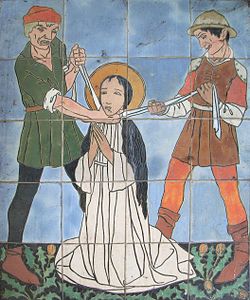strangle
Hello, you have come here looking for the meaning of the word strangle. In DICTIOUS you will not only get to know all the dictionary meanings for the word strangle, but we will also tell you about its etymology, its characteristics and you will know how to say strangle in singular and plural. Everything you need to know about the word strangle you have here. The definition of the word strangle will help you to be more precise and correct when speaking or writing your texts. Knowing the definition ofstrangle, as well as those of other words, enriches your vocabulary and provides you with more and better linguistic resources.

A drawing showing a woman being strangled.
English
Etymology
From Middle English stranglen, from Old French estrangler, from Latin strangulō, strangulāre, from Ancient Greek στραγγαλόομαι (strangalóomai, “to be strangled”), from στραγγάλη (strangálē, “a halter”); compare στραγγός (strangós, “twisted”) and string. Displaced Middle English wirien, awurien (“to strangle”) (> English worry).
Pronunciation
- (Received Pronunciation) IPA(key): /ˈstɹæŋɡ(ə)l/
Audio (Southern England): (file) - (General American) IPA(key): /ˈstɹæŋɡəl/
- Rhymes: -æŋɡəl
- Hyphenation: stran‧gle
Verb
strangle (third-person singular simple present strangles, present participle strangling, simple past and past participle strangled)

- (transitive) To kill someone by squeezing the throat so as to cut off the oxygen supply; to choke, suffocate or throttle.
- She strangled her husband and dissolved the body in acid.
- 1936, Robert Frost, “The Vindictives”, in A Further Range:
- And his subjects wrung all they could wring / Out of temple and palace and store. / But when there seemed no more to bring, / His captors convicted the king / Of once having started a war, / And strangled the wretch with a string.
- (transitive) To stifle or suppress.
- He strangled a scream.
- (intransitive) To be killed by strangulation, or become strangled.
- The cat slipped from the branch and strangled on its bell-collar.
- (intransitive) To be stifled, choked, or suffocated in any manner.
- c. 1591–1595 (date written), William Shakespeare, “The Tragedie of Romeo and Ivliet”, in Mr. William Shakespeares Comedies, Histories, & Tragedies (First Folio), London: Isaac Iaggard, and Ed Blount, published 1623, →OCLC, :
- Shall I not then be stifled in the vault, / And there die strangled ere my Romeo comes?
- 1626, Ovid, “The Eighth Booke”, in George Sandys, transl., Ovid’s Metamorphosis Englished , London: ">…] William Stansby, →OCLC, page 165:
- Her, vvhom his furie hath from earth exil'd, / And in the ſtrangling vvaters drencht his child;
Derived terms
Related terms
Translations
to kill someone by strangulation
|
to stifle or suppress
|
Noun
strangle (plural strangles)
- (finance) A trading strategy using options, constructed through taking equal positions in a put and a call with different strike prices, such that there is a payoff if the underlying asset's value moves beyond the range of the two strike prices.
See also
Further reading
- “strangle”, in Webster’s Revised Unabridged Dictionary, Springfield, Mass.: G. & C. Merriam, 1913, →OCLC.
- William Dwight Whitney, Benjamin E Smith, editors (1911), “strangle”, in The Century Dictionary , New York, N.Y.: The Century Co., →OCLC.
- “strangle”, in OneLook Dictionary Search.
Anagrams
Middle English
Verb
strangle
- alternative form of stranglen